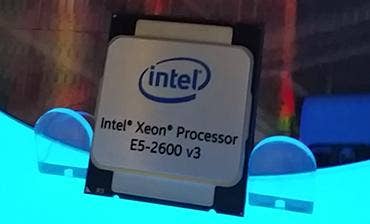Intel's New 18-Core Xeon Sparks Server Bonanza

Intel launched its latest Xeon family of processors that boasts as many as 18 cores, a 3X performance boost, and support for DDR4 memory for fast application performance in a world quickly moving to software-defined architectures.
The new processor families, known as Grantley, consist of the E5-2600 v3 and E5-1600 v3 processors. Intel unleashed 32 SKUs and an additional 20 custom SKUs designed for customers and their specific workload needs. The processors are available Monday, with a host of system vendors including rolling out servers in tandem with Intel's news.
"We are very excited to collectively re-architect the data center with this new Xeon platform. With the new Xeon chips we move to a software-defined world -- from static to dynamic, from siloed to open, and from proprietary to open standards running on standard architecture," said Diane Bryant, senior vice president and general manager of the Data Center Group at Santa Clara, Calif.-based Intel, at a press event unveiling the new processors.
[Related: Partners: Intel's Xeon Grantley Chip Will Be Big Revenue Driver]
The Xeon chip highlights include baked-in monitoring and management features for automated deployment and improved servicing capabilities. The processor also emphasizes three workload types, including compute horsepower, storage optimization and the ability to juggle a variety network workloads. Another highlight includes a performance increase with up to a 3X boost in horsepower compared with previous Ivy Bridge generation processors.
The move to software-defined infrastructure is inevitable and necessary, Bryant said. Intel's Xeon processors are optimized for that transition with nearly 50 SKUs optimized for specific customer needs, she said.
Intel's Xeon chip news coincided with the flurry of new system announcements from Cisco Systems, Hewlett-Packard, Lenovo, Dell and IBM. Intel said that as of Monday's launch there are 65 servers shipping from various OEMs with hundreds more to launch later this year.
NEXT: System Vendors Shipping Xeon Servers
Cisco, San Jose, Calif., refreshed its UCS server line with two major additions based on the Xeon processor. The first is a new line of modular servers dubbed the Cisco M-Series. The line features a new Cisco 2U chassis that fits up to eight compute modules, each of which consists of two independent Intel Xeon E3 servers. By putting 16 servers in 2U of rack space, Cisco is focusing on high-density implementations. And rather than including storage and networking on each server, the eight modules share four SSDs and dual 40-Gbit Ethernet connectivity.
Cisco also took the wraps off the UCS Mini, which uses existing B-Series blade chassis and blades, but adds the Cisco UCS 6324 Fabric Interconnect, a small device that plugs into the back of the chassis. The Cisco UCS 6324 provides network connectivity for up to eight Cisco UCS blade servers and seven direct-connect rack servers, giving it a total domain of up to 15 Cisco servers. The UCS 6324 replaces more expensive Cisco Fabric Extenders, making the UCS Mini more suitable to remote and branch office and edge computing applications.
HP, Palo Alto, Calif., told CRN prior to the Intel Grantley launch that it plans to introduce 21 new platforms as part of its ProLiant Gen9 family through fiscal year 2015, with the higher performance of the new processors to be married to RESTful APIs, a modular architecture to increase configuration flexibility, and HP's OneView infrastructure management application for both physical resources and clouds.
Lenovo Monday showed it is pushing ahead on development of its own ThinkServer line despite the pending acquisition of IBM's server business. The Beijing-based company is unveiling two rackmount and one tower server that use the ASHRAE A4 control standard to run at 113 degrees Fahrenheit continuously to significantly cut cooling requirements.
The new Lenovo servers also include the company's AnyRAID solution, which allows any RAID adapter to connect to the server backplane; AnyFabric to allow choice of networking fabric; and AnyBay technology to allow the use of any SAS, SATA or PCIe drives. They also feature an M2 connector for miniature SSDs that can be used to decrease boot time.
Dell Monday touted flash storage and ease of management in its new 13G (generation 13) server line. One new model has a tier of 18 1.8-inch SATA SSDs paired with a tier of eight 3.5-inch spinning drives that takes advantage of the Microsoft Storage Spaces to manage the tiers. The Round Rock, Texas, company also added a common connector that allows SATA, SAS and PCIe flash and spinning drives to be easily added depending on requirements.
Next: Dell Utilizes Intel System Management Features
On the management side, Dell introduced ZeroTouch, which allows servers to automatically configure themselves once installed. Another new capability is iDRAC QuickSync, which Dell said makes it the first server vendor to provide NFC-enabled technology that allows an administrator to get server updates via a smart device just by tapping the device to the server. Dell also introduced iDRAC Direct, which automatically configures servers by plugging in a USB drive.
IBM, meanwhile, unveiled its M5 portfolio of x86 servers, with an emphasis on security, efficiency and reliability. As IBM, Armonk, N.Y., readies the sale of its x86 business to Lenovo, the company is taking additional steps to quell any concerns over security with a revamp of its Trusted Platform Module that includes more encryption features and support for a new Secure Firmware Rollback feature that prohibits any unauthorized updates of previous firmware versions.
IBM's product mix includes System X servers that range in configuration from 1U to an all-in-one 5U, two-socket rack and tower designs. The new Xeon chips also will power new Flex System and NeXtScale systems aimed at high-density and energy-efficient enterprise workloads.
PUBLISHED SEPT. 8, 2014